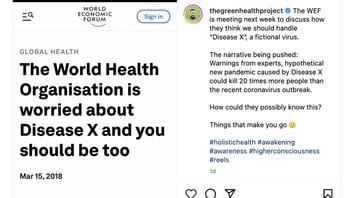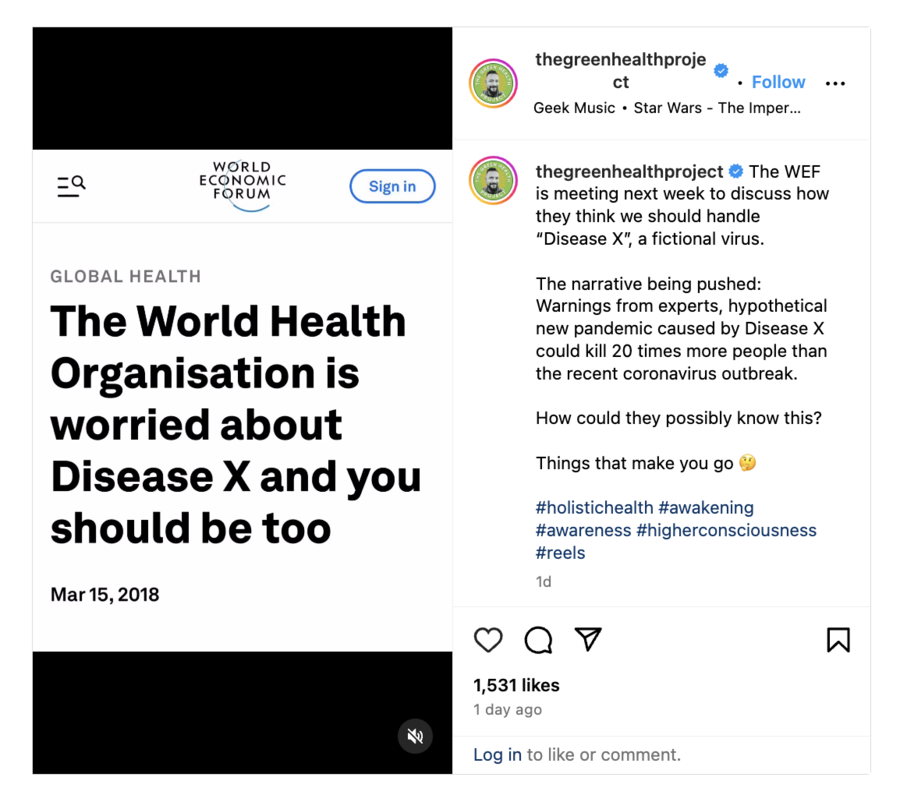STORY UPDATED: check for updates below.

Does a meeting about "Disease X" at the World Economic Forum in Davos, Switzerland, prove the existence of some sinister plan to start a pandemic intentionally? No, that's not true: The panel discussion to be led by the World Health Organization's director general can be viewed online. The planned agenda is a discussion of preparedness for the next pandemic, not the launch of a pandemic. Calling the hypothetical outbreak "Disease X" (using the mathematical term for an unknown quantity) reflects the reality that pandemics may be caused by diseases not currently known to scientists and health care professionals.
The story appeared in a post (archived here) published on Instagram on January 14, 2024. It opened:
The WEF is meeting next week to discuss how they think we should handle "Disease X," a fictional virus.
The narrative being pushed: Warnings from experts, hypothetical new pandemic caused by Disease X could kill 20 times more people than the recent coronavirus outbreak.
How could they possibly know this?
Things that make you go 🤔
#holistichealth#awakening#awareness#higherconsciousness#reels
The January 17, 2024, meeting (archived here) the post referred to is is one of the public sessions at the World Economic Forum in Davos. General audiences can watch it online.
Preparing for Disease X
With fresh warnings from the World Health Organization that an unknown "Disease X" could result in 20 times more fatalities than the coronavirus pandemic, what novel efforts are needed to prepare healthcare systems for the multiple challenges ahead?
Disease X represents the knowledge that a serious international epidemic could be caused by a pathogen currently unknown to cause human disease.
Targeting priority pathogens and virus families for research and development of countermeasures is essential for a fast and effective epidemic and pandemic response.
On January 15, 2024, the WHO's media relations department told Lead Stories via email:
Starting in 2022, WHO convened over 300 scientists to consider the evidence on over 25 virus families and bacteria, as well as "Disease X." ... The experts will recommend a list of priority pathogens that need further research and investment. The process will include both scientific and public health criteria, as well as criteria related to socioeconomic impact, access, and equity.
A January 15, 2024, Bloomberg article (archived here) summarized the practical aspects behind prioritizing unknown diseases:
The idea was to encourage the development of platform technologies, including vaccines, drug therapies and diagnostic tests, that could be rapidly adapted and deployed in response to an array of future outbreaks with epidemic or pandemic potential.
COVID-19 was an example of "Disease X" when the world first learned about the new virus in 2019. Now it's placed on the priority list under its name along with Ebola, Zika, SARS and some other illnesses.
In January 2024, Mark Woolhouse (archived here), a professor of infectious disease epidemiology at the University of Edinburgh, told UK's Standard (archived here) that he was among those who lobbied for the inclusion of "Disease X" to the WHO priority list. He also added that scientists can never foresee all the details of how pandemics may unfold:
We can't put a handle on when, of course. The precise mechanism by which a virus comes out is always extremely unpredictable. (...) You can never predict precise events, so you have to do it on sort of statistical grounds probability.
Lead Stories reached out to Woolhouse for additional comments.
False claims built around "Disease X" appeared on social media previously as Google Fact Checks Explorer shows (archived here.) Lead Stories previously debunked one of them, too.
Those claims are variations of a larger conspiracy theory alleging that global elites are secretly plotting the implementation of a new "planned" pandemic.
Both the WEF and the WHO have been long-term targets of such false narratives.
Other Lead Stories fact checks about topics related to the COVID-19 pandemic can be found here.
Updates:
-
2024-01-16T22:12:27Z 2024-01-16T22:12:27Z Adds response from WHO's media relations department.


















